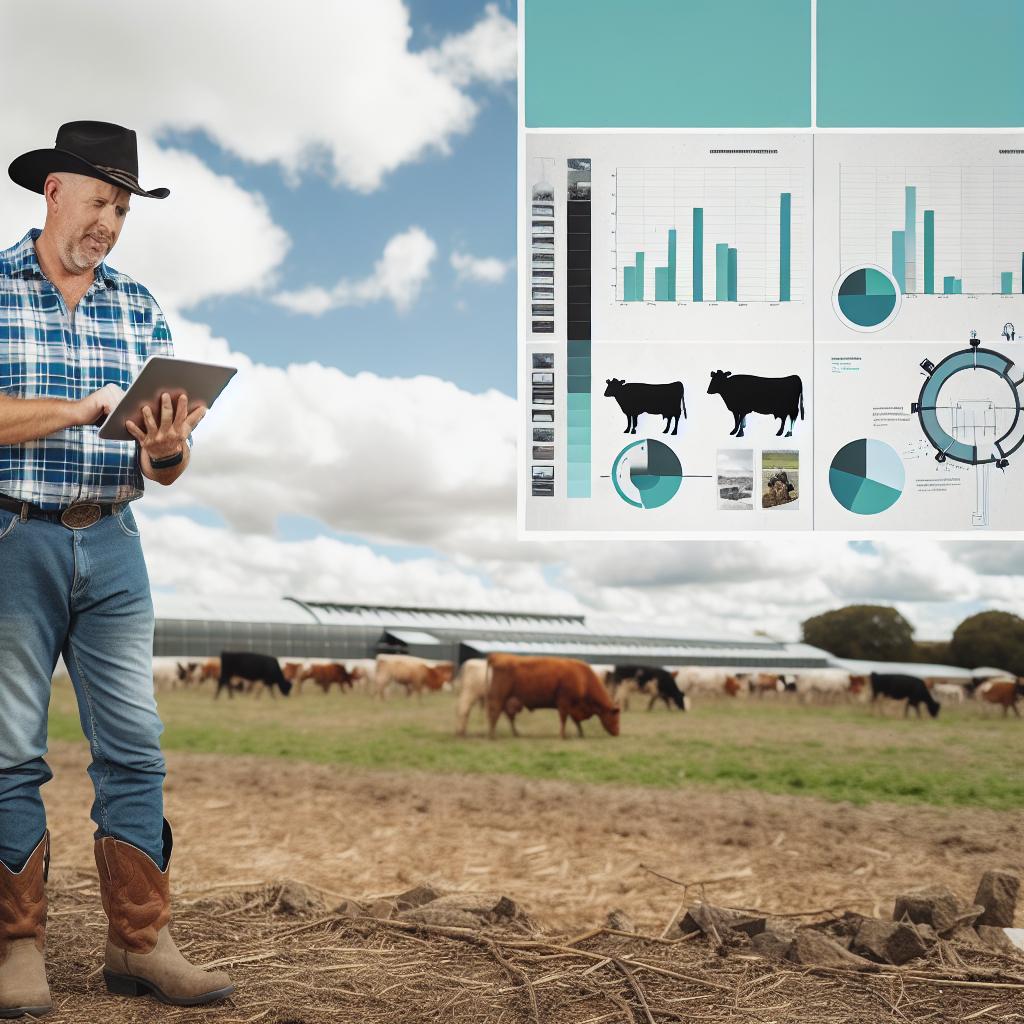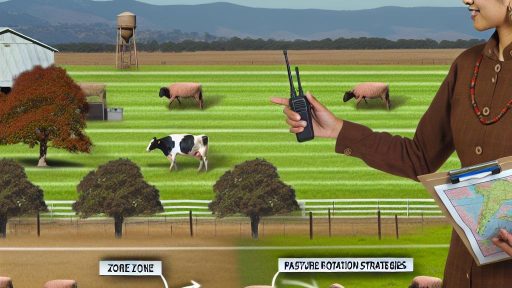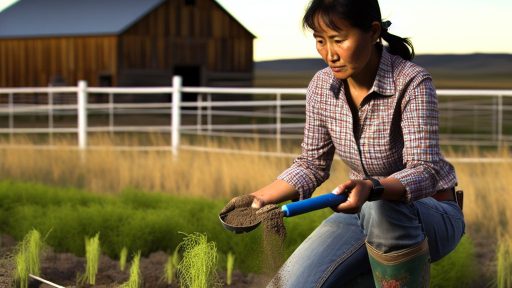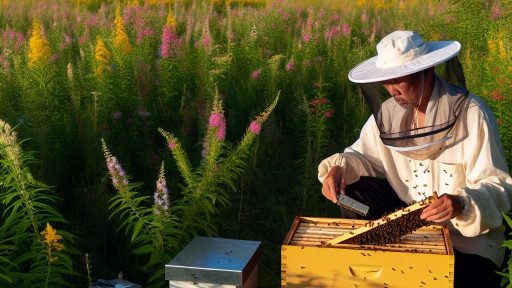Introduction to Climate Resilience in Organic Livestock Management
Climate change presents challenges for all forms of agriculture, including organic livestock management.
This management approach emphasizes sustainable practices and animal welfare.
However, climate variability can disrupt optimal conditions for livestock health and productivity.
Understanding Climate Resilience
Climate resilience refers to adapting farming practices to withstand environmental stresses.
It involves implementing techniques that enhance the farm’s ability to recover from adverse conditions.
Adopting resilient practices ensures that organic livestock operations can continue to thrive.
Importance of Organic Practices
Organic livestock management prioritizes ecological balance and animal health.
It promotes the use of natural feed, avoiding synthetic chemicals and antibiotics.
Such practices inherently align well with climate resilience principles.
Incorporating sustainability strengthens the overall resilience of farming systems.
Strategies for Implementing Climate-Resilient Solutions
Farmers can adopt various strategies to enhance climate resilience in livestock management.
- Diversifying livestock breeds can increase adaptability to different climate conditions.
- Implementing agroforestry practices benefits both the environment and animal welfare.
- Using rotational grazing helps maintain pasture health and reduces soil erosion.
These strategies contribute to a balanced ecosystem that supports livestock health.
Monitoring and Data-Driven Decisions
Effective climate resilience requires ongoing monitoring of environmental conditions.
Using climate data enables farmers to make informed decisions regarding livestock management.
Implementing technology like weather forecasting tools can aid in planning and preparedness.
Transform Your Agribusiness
Unlock your farm's potential with expert advice tailored to your needs. Get actionable steps that drive real results.
Get StartedThis proactive approach minimizes risks associated with climate variability.
Community and Support Networks
Engaging with local agricultural communities fosters knowledge sharing and resource exchange.
Farmers can benefit from collective experiences and solutions regarding climate challenges.
Building a support network leads to better resilience at both individual and community levels.
Integrating climate-resilient practices is essential for the future of organic livestock management.
By focusing on adaptability and sustainability, farmers can ensure long-term success in the face of climate change.
Understanding the Impact of Climate Change on Livestock Production
Climatic Variability and Livestock Health
The changing climate presents significant challenges to livestock health.
Extreme weather events such as heatwaves and floods directly affect animal well-being.
As temperatures rise, livestock may experience heat stress.
Heat stress impacts feed intake and overall productivity.
Moreover, heavy rainfall can lead to flooding in grazing areas.
This flooding can result in the loss of pasture and shelter for livestock.
Nutrition and Feed Availability
Climate change alters the availability of quality feed.
Changes in rainfall patterns affect crop yield and forage quality.
Consequently, livestock may face nutritional deficiencies.
Quality feed is essential for optimal growth and reproduction.
Farmers need to adapt feeding strategies in response to these changes.
Animal Disease and Parasite Management
Warmer temperatures may expand the range of parasites and diseases.
Livestock become more susceptible to infections as conditions change.
Farmers must increase vigilance and vaccination efforts.
In addition, pest control strategies need to be adjusted accordingly.
Water Resources and Management
Water availability is likely to decline due to climate change.
Livestock require a constant supply of clean water.
Farmers face challenges in maintaining water quality and access.
Showcase Your Farming Business
Publish your professional farming services profile on our blog for a one-time fee of $200 and reach a dedicated audience of farmers and agribusiness owners.
Publish Your ProfileEfficient water management practices become crucial in these circumstances.
Economic Implications
Climate change affects the economic viability of livestock production.
Higher feed costs will impact farmers’ profitability.
Moreover, reduced productivity can lead to financial losses.
Farmers may need to invest in climate-resilient technologies.
These investments can mitigate the adverse effects of climate change.
Overview of Organic Livestock Management Practices
Organic livestock management focuses on raising animals without synthetic chemicals.
This approach emphasizes animal welfare and environmental sustainability.
Farmers must adhere to strict regulations for organic certification.
Key Principles of Organic Livestock Management
Animal health and well-being are paramount in organic practices.
Farmers prioritize natural breeding methods over artificial solutions.
Furthermore, organic livestock receive organic feed free from additives.
These principles enhance meat, milk, and egg quality.
Pasture-Based Systems
Pasture-based systems are vital for organic livestock management.
Animals freely graze on natural forage, enriching their diets.
This method improves soil health and reduces feed costs.
It also supports biodiversity in the ecosystem.
Integrated Pest Management
Organic farmers utilize integrated pest management strategies.
This approach reduces reliance on chemical pesticides.
Farmers often choose natural predators to control pests.
Additionally, they might use organic-approved substances for pest control.
Community and Economic Benefits
Organic livestock management promotes local economies.
It encourages community-supported agriculture programs.
Furthermore, consumers increasingly prefer ethically sourced products.
This demand boosts sales for organic farmers.
Gain More Insights: Remote Sensing in Precision Livestock Farming for Improved Feed Management
Strategies for Enhancing Soil Health and Biodiversity in Livestock Systems
Building Healthy Soil
Healthy soil is the foundation of sustainable livestock management.
Implementing cover crops enriches soil organic matter.
This practice improves soil structure and prevents erosion.
Additionally, using reduced tillage techniques preserves soil integrity.
Integrating compost helps to enhance nutrient availability.
Since compost adds beneficial microorganisms, it supports overall soil health.
Encouraging Biodiversity
Biodiversity is crucial for resilient farming systems.
Diverse plant and animal species contribute to ecosystem stability.
Rotational grazing allows pasture recovery and promotes biodiversity.
This method encourages a balance of grasses and legumes.
Planting native species can provide habitat for local wildlife.
Moreover, indigenous plants often require fewer inputs to thrive.
Implementing Agroforestry Practices
Agroforestry integrates trees into livestock systems.
This combination enhances habitat for various organisms.
Showcase Your Farming Business
Publish your professional farming services profile on our blog for a one-time fee of $200 and reach a dedicated audience of farmers and agribusiness owners.
Publish Your ProfileFurthermore, tree cover protects livestock from extreme weather.
It also promotes nutrient cycling and soil moisture retention.
Incorporating fruit trees can provide additional food sources.
Consequently, this approach can diversify farmers’ income streams.
Utilizing Natural Pest Management
Natural pest management reduces dependence on chemicals.
Utilizing beneficial insects can control pest populations organically.
Encouraging bird populations through nesting sites aids pest control.
Regular monitoring helps identify pest issues before they escalate.
Moreover, diversified cropping systems support ecological pest management.
Thus, these practices contribute to healthier livestock and ecosystems.
Fostering Community Engagement and Knowledge Sharing
Community involvement is essential for successful implementation.
Workshops help farmers learn about sustainable practices.
Additionally, local partnerships can enhance resource sharing.
Furthermore, collaborating with universities promotes research and innovation.
Field days allow farmers to exchange valuable experiences.
By fostering a supportive community, practices are more likely to succeed.
Find Out More: Sustainable Livestock Practices for Regenerative Agriculture
Water Management Techniques for Organic Livestock in a Changing Climate
Importance of Water Management
Water management is crucial for organic livestock farming.
It directly impacts animal health and productivity.
Moreover, effective water strategies enhance resilience to climate change.
Rainwater Harvesting
Harvesting rainwater is an efficient technique for sustainable farming.
This practice captures rainfall for future use.
In addition, it reduces dependency on external water sources.
Farmers can install collection systems at strategic locations.
These systems should be designed to optimize water retention.
Efficient Irrigation Systems
Implementing efficient irrigation systems helps conserve water.
Drip irrigation delivers water directly to plant roots.
This method reduces evaporation and runoff significantly.
Farmers may also consider scheduling irrigation based on weather forecasts.
Smart irrigation systems can automate this process effectively.
Water Quality Monitoring
Monitoring water quality is essential for livestock health.
Regular testing can detect harmful contaminants.
Farmers should implement routine checks to ensure safe water supply.
Using filtration systems can improve water quality significantly.
Moreover, maintaining clean water troughs prevents algae growth.
Shade and Water Access
Providing shade near water sources improves livestock comfort.
Animals are more likely to drink water when shaded.
Access to cool, shaded areas reduces heat stress in livestock.
Farmers can plant trees or build structures to create shade.
This also benefits the local ecosystem and provides additional habitat.
Showcase Your Farming Business
Publish your professional farming services profile on our blog for a one-time fee of $200 and reach a dedicated audience of farmers and agribusiness owners.
Publish Your ProfileEducation and Training
Education on water management techniques is vital for farmers.
Workshops and training sessions can enhance knowledge and skills.
Farmers can share experiences and successful strategies with one another.
Moreover, local agriculture departments can provide resources and support.
Investing in education leads to smarter water management practices.
Gain More Insights: Sustainable Livestock Practices for Minimizing Antibiotic Use

Developing Robust Animal Health and Nutrition Plans to Combat Climate Stress
Understanding Climate Stress in Livestock
Climate stress significantly impacts livestock health and productivity.
This stress can arise from extreme temperatures, humidity, and irregular weather patterns.
Moreover, animals may experience health issues due to heat stress and nutritional deficiencies.
Creating Comprehensive Nutrition Plans
First, assess the nutritional needs of your organic livestock.
Identify essential vitamins, minerals, and macronutrients necessary for optimal health.
Adjust feed rations based on the livestock’s specific life stages and climate conditions.
Incorporating high-quality forages can boost overall nutrition and enhance resilience.
Implementing Health Monitoring Strategies
Regular health monitoring plays a critical role in identifying issues early.
Employ routine check-ups and vaccinations to prevent disease outbreaks.
Education about signs of stress can help farmers respond promptly to livestock needs.
Utilizing Stress-Reducing Practices
Design housing that minimizes heat stress during extreme weather conditions.
Ensure good ventilation and access to shade or cooling systems.
Additionally, consider rotational grazing to improve pasture resilience.
Strengthening Animals’ Immune Systems
Implement strategies to enhance animals’ natural immunity.
This can include probiotics and prebiotics to support gut health.
Also, consider herbal supplements known for their immune-boosting properties.
Engaging in Continuous Education and Training
Lasty, prioritize continuous education in livestock management practices.
Attend workshops and seminars to stay updated on the latest research.
Networking with experts can also provide valuable insights into effective strategies.
Explore Further: How Proper Foot Care Can Prevent Lameness in Farm Animals
Incorporating Agroecological Principles in Organic Livestock Farming
Understanding Agroecological Principles
Agroecological principles form the backbone of sustainable farming practices.
These principles emphasize working with nature, not against it.
They enhance biodiversity within agricultural systems.
Additionally, they promote soil health and ecosystem resilience.
Farmers can create a more balanced environment for livestock.
Implementing Diversified Farming Systems
Diversifying farming systems leads to greater resilience.
This approach includes integrating crops and livestock effectively.
Mixed farming allows various species to coexist peacefully.
It also reduces the risk of total crop failure.
Farmers can improve resource use efficiency through diversification.
Rotational Grazing Benefits
Rotational grazing improves pasture quality and biodiversity.
This method allows pastures to recover between grazing periods.
As a result, it enhances soil fertility and plant health.
Livestock benefit from better nutrition due to varied forage.
Showcase Your Farming Business
Publish your professional farming services profile on our blog for a one-time fee of $200 and reach a dedicated audience of farmers and agribusiness owners.
Publish Your ProfileAdditionally, this practice mitigates overgrazing issues.
Soil Management Techniques
Healthy soil supports overall livestock production systems.
Organic practices enhance soil quality over time.
Methods such as composting improve nutrient cycling.
Cover cropping protects soil from erosion and improves moisture retention.
Utilizing mulching minimizes weeds and retains soil moisture.
Utilizing Local Resources
Using local resources strengthens sustainable agriculture.
Farmers should prioritize on-farm inputs over external ones.
This approach reduces costs and reliance on external inputs.
It also increases self-sufficiency within farming systems.
For example, farmers can create their own feeds and fertilizers.
Community Engagement and Knowledge Sharing
Community engagement is vital for successful livestock management.
Farmers should share knowledge and experiences with peers.
Participating in local agricultural networks enhances learning opportunities.
This collaborative approach fosters innovation and adaptation.
It also strengthens social ties within farming communities.
Engaging Farmers and Stakeholders
Importance of Education in Resilient Practices
Education plays a crucial role in implementing climate-resilient solutions.
It equips farmers with the necessary knowledge and skills.
Furthermore, stakeholder involvement enhances communication and collaboration.
This process fosters collective problem-solving among various parties.
Ultimately, an informed community adapts more effectively to climate challenges.
Training Programs for Farmers
Training programs are vital for effective organic livestock management.
These programs should address specific climate-related challenges.
Topics may include sustainable grazing and feed management.
Moreover, workshops can demonstrate practical techniques and strategies.
Hands-on training enables farmers to apply concepts on their farms.
Utilizing Local Knowledge and Practices
Local knowledge is an invaluable resource in resilient agriculture.
Farmers often possess insights into their unique environments.
Emphasizing traditional practices can lead to innovative solutions.
By sharing experiences, they can refine and adapt strategies.
This collaboration fosters a sense of community and shared responsibility.
Building Partnerships for Broader Impact
Establishing partnerships is key to enhancing resilience in agriculture.
Collaboration between farmers, NGOs, and government entities can drive change.
Such partnerships facilitate resource sharing and collective learning.
Engaging with universities can promote research and innovation.
These alliances amplify the impact of climate-resilient practices.
Incentives and Support Systems
Implementing incentives encourages farmers to adopt sustainable practices.
Financial support can alleviate the burden of transitioning methods.
Additionally, technical assistance aids farmers in implementing new strategies.
Support systems vary from grants to loans tailored for organic practices.
Showcase Your Farming Business
Publish your professional farming services profile on our blog for a one-time fee of $200 and reach a dedicated audience of farmers and agribusiness owners.
Publish Your ProfileUltimately, these measures promote a sustainable agricultural future.




